In the age of mobile search, consumers are always looking online to find the biggest deals. They search for quality products and services and rely on reviews, testimonials and online presentations for making their choices. This holds true for restaurants and restaurant SEO is an important factor for being found online.
Big restaurant chains have the luxury of being able to leverage massive budgets to draw customers to their locations. Television ads and extensive PR campaigns make big restaurant brands appeal to the consumers’ psyche. This leads to millions of customers merely by constantly being visible.
On the other hand, small and medium restaurants must find effective ways to get their message across. An intelligently planned and constructed online presence is the best strategy for small to medium-sized restaurant owners to get noticed online. An efficient and effective website is a great tool for getting customers through your restaurant’s doors.
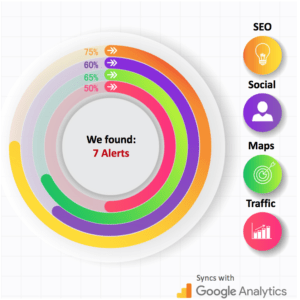
What is Restaurant SEO?
SEO stands for Search Engine Optimization. It is the set of actions a website owner must take in order to get their website ranked in the top search engine results. Restaurant SEO, therefore, is the mix of tactics you must apply to your website in order to climb the rankings and draw customers to your website and, eventually, your restaurant.
While search engine optimization is a universal concept for websites, there are several concepts that are exceptionally effective for restaurants. As a restaurant owner, you should be aware of what constitutes the best strategy for achieving your goals.
The first page of Google captures 71% of search traffic clicks and has been reported to be as high as 92% in recent years.” -Moz
Best Strategy to Increase Foot Traffic
Before getting into the mechanics of SEO, it’s a good idea to look at how foot traffic can be increased. Some of the ways to do this include offline actions and some relate to your digital marketing. In any case, anything that increases foot traffic will tie in with SEO efforts to a lesser or greater extent.
Store Signage and Logos
Your internet presence will be more effective at bringing customers to your restaurant when your branding is consistent. Your logo and any signage should be of the same font and colors as your website. Users that run into your digital real estate will easily recognize your brick and mortar establishment and connect it to their online experience. Consistency is key. Notice the restaurant below, the left photo is their physical location and the right is their webpage. Notice the consistency in color and logo.
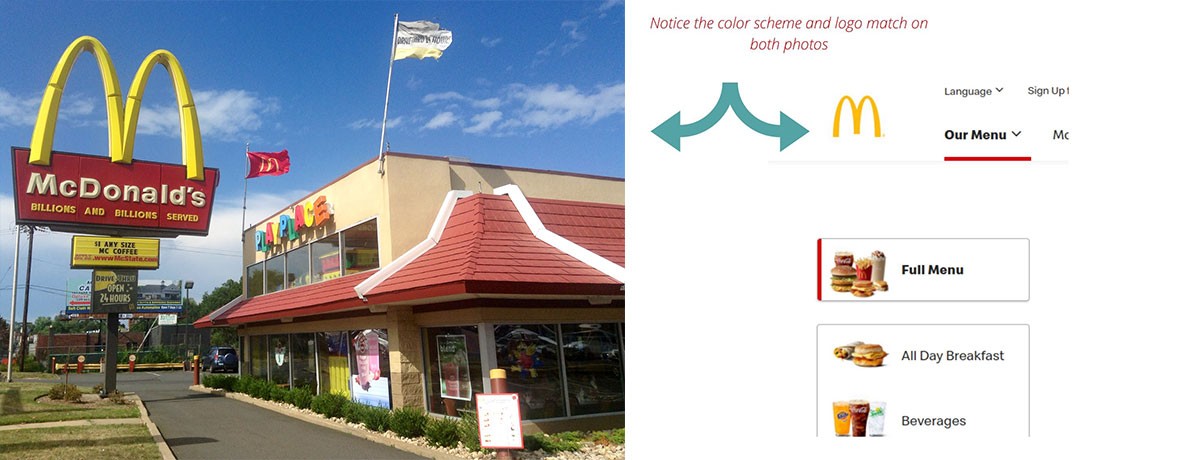
Mobile Friendly
You should place your focus on optimizing your website for mobile users. According to Statista, approximately 53 percent of global website traffic comes from mobile devices. If your site takes too long to load or looks unprofessional on a mobile device, customers will quickly pass you by for a site that is more mobile friendly. More on this below.
Events
Holding events can be a great way to increase foot traffic. The added benefit that events provide is the ability to target specific audiences. Family restaurants can hold events that cater to children whereas an upscale bistro with an extensive wine catalog can conduct wine tastings.
When combined with an effective website and a solid social media presence, events can build a loyal clientele if done right. When conducting an event, have a plan in place to make regular clients out of any first-time visitors. A call to action or a gift certificate can help to this end.
In-Restaurant Expertise and Quality
Whether you have an accomplished chef or a talented barista on staff, promoting them online can help build authority. Maybe you have some delicious recipes straight from your family in Sicily or you import spices from the Middle East. People resonate with quality and if there’s a story behind any aspect of your restaurant, you should tell it.
A beautiful and user-friendly website can showcase your unique talents and dedicated staff. As you will find out, success online isn’t only about the mechanics of SEO. Telling your story and creating a riveting brand will create synergies that will translate to a better bottom line.
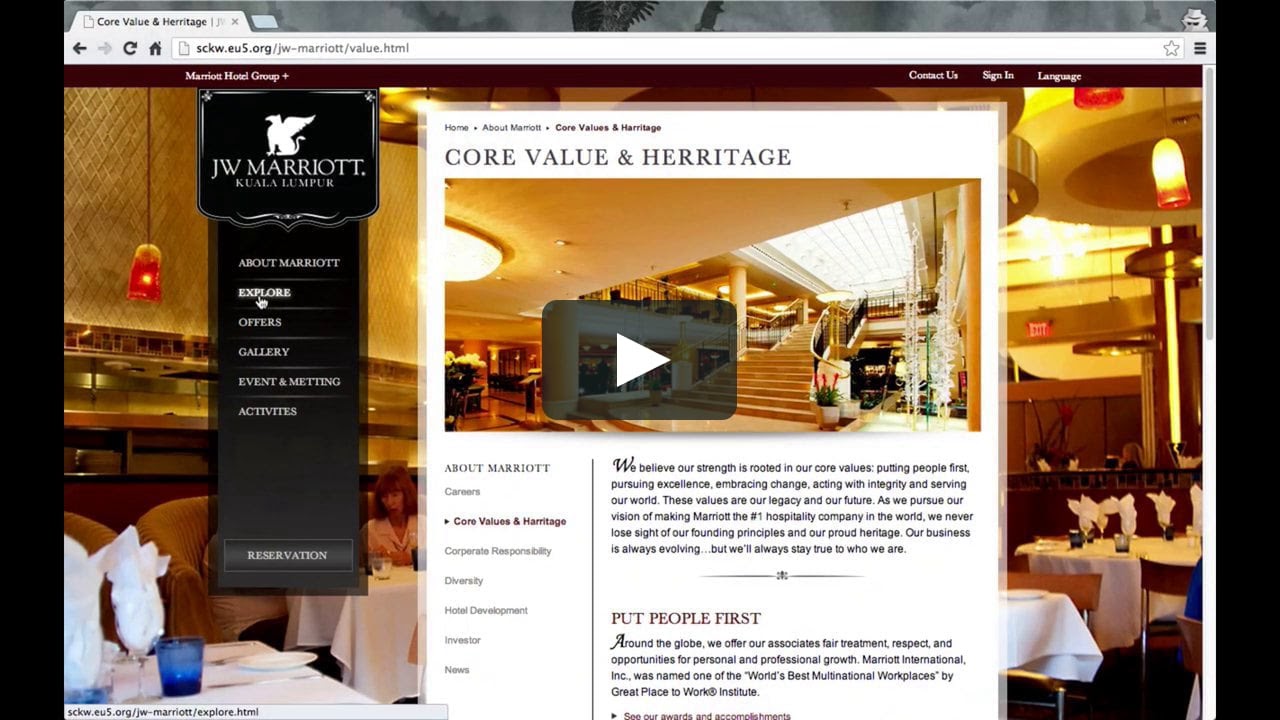
Using a compelling brand story like the one above can humanize your website, pulling the reader in. This will eventually translate into higher foot traffic and sales.
You Might Also Like
Loyalty Programs
Depending on how you brand your restaurant, a loyalty program can help increase foot traffic. Families eat out regularly due to convenience. Having a loyalty program that is mutually beneficial to your patrons and your business can increase the frequency at which customers visit your restaurant. If you have a gourmet establishment, you can either pass on this idea entirely or establish a more sophisticated version.
The effectiveness of a loyalty program can boost your results if combined with a mobile app or a newsletter. Being able to maintain communication with your customers and encouraging them to share their positive experiences builds loyalty. The better their experience, the greater the word of mouth dissemination of your message. In this regard, a solid loyalty program can be more effective than the massive ad campaigns of big restaurant chains.
Did you know? According to loopyloyalty.com, ‘Annex Cloud’s customer loyalty statistics showed that loyalty programs increased their overall revenue by 5–10%, loyalty members spent 5–20% more than non-members on average, and loyalty program members bought 5–20% more frequently than non-members.’
Keyword Research
Now we are getting to the meat and potatoes of online digital marketing for your restaurant. Keyword research is the act of finding all words and phrases that are relevant to the promotion of your business. These keywords will be used in your content so your posts and pages rank accordingly in the search engine results.
How to Find Keywords for Restaurants
If you’re wondering how to find keywords for restaurants, you’ll be relieved to know that it isn’t a difficult process. Keyword research is a combination of brainstorming and competitive research. Think of all the terms that are relevant to your restaurant and write them down. Next, check to see what keywords your direct competition ranks for. Then, add location-based terms, keywords that describe your target audience and any other relevant phrase.
For instance, if you own a Thai restaurant in Albany, New York, ranking for the keyword ‘Thai food’ is not enough. A general term like this can be used by someone searching for recipes in order to prepare a meal at home as well as the family looking for a superb dining experience. This doesn’t mean that you shouldn’t take advantage of such keywords. Maybe you can have Thai recipes on your site for internet users to try.
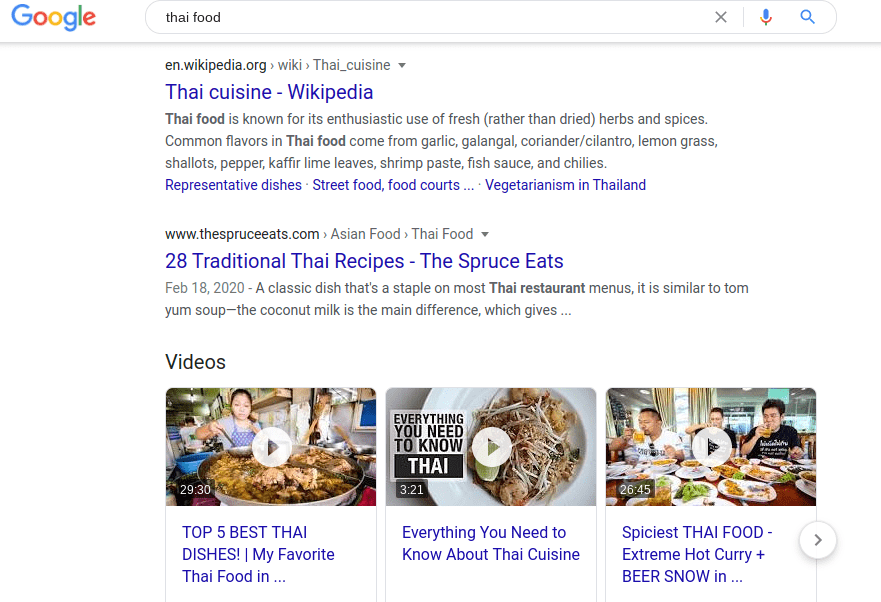
While this screen shot does depict the page just under the Google My Business listings, these sites are among the top websites listed. Contrast that to a google search with location added and you see something like this (again taken just under the Google My Business listings):
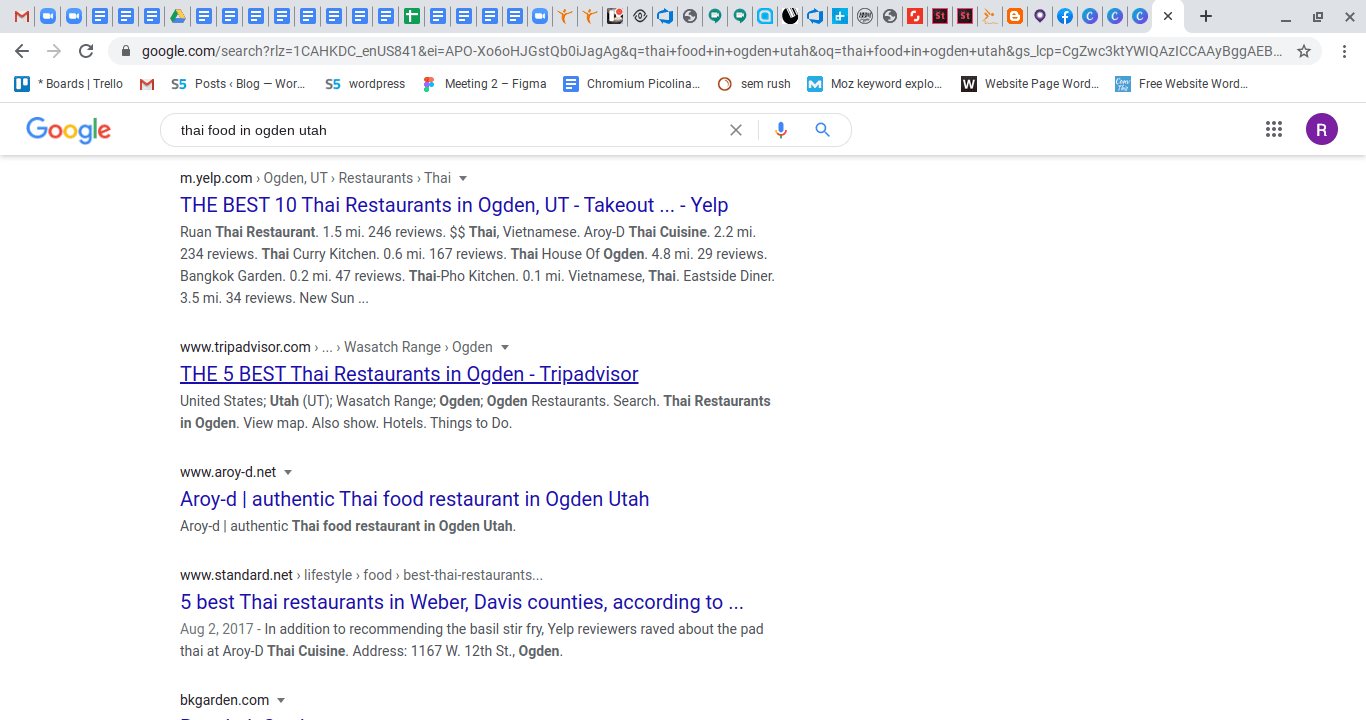
However, someone that searches for ‘Thai restaurant Ogden Utah’ is looking for something a bit more specific. According to Google, 93 percent of people that research a product or service on their mobile device go on to complete the purchase. If you own a Thai restaurant in the area in question and you rank in the top results in Google for that phrase, chances are you just gained a patron.
Test your SEO in 60 seconds!
Diib is one of the best SEO tools in the world. Diib uses the power of big data to help you quickly and easily increase your traffic and rankings. We’ll even let you know if you already deserve to rank higher for certain keywords.
- Easy-to-use automated SEO tool
- Keyword and backlink monitoring + ideas
- Speed, security, + Core Vitals tracking
- Intelligently suggests ideas to improve SEO
- Over 500,000k global members
- Built-in benchmarking and competitor analysis
Used by over 500k companies and organizations:
Syncs with 
10 Tips for Best Local Ranking
Now that you know the dynamics of leveraging your website to gain customers, it’s time to look at specifics. By implementing these restaurant SEO tips into your strategy, you will gradually start to see measurable results.
Optimize Your Restaurant Website
For almost two decades, optimizing a website was centered around things such as securing links pointing to your site and counting the density of keywords in your text. Recently, Google announced its most important algorithm update in five years. This new update, Bert, allows Google to rank your content based on the language used. How exactly does this work? Check out this graphic.
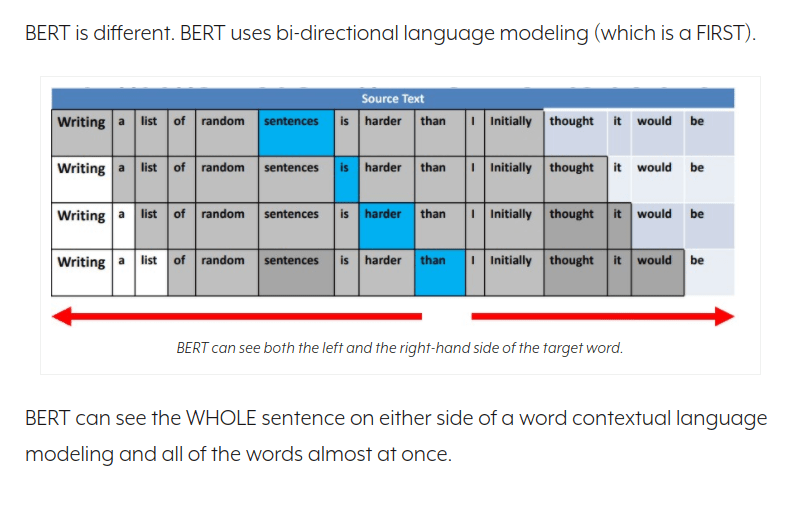
In effect, rather than just scanning for keywords, the algorithm now has the ability to judge your semantics. It’s as close as having a human editor read through your content as you can imagine. The point of this recent update is to place the focus on quality content rather than manual tricks. This will obviously make high quality content one of the most important ranking factors.
Post Quality Content Regularly
Gone are the days where a restaurant website consisted of a page about the business, the menu and a contact form. In order to rank highly in the search results, considerable effort needs to be dedicated to creating content. The regularity with which you should post content is not predetermined by any factor. As with your keyword research, it may behoove you to do some competitive research. The frequency with which your immediate competition posts to their website is one criterion to consider.
Furthermore, your analytics will guide the way in determining how often you post. You want to find a sweet spot where your audience is checking back in to consume your content while leaving them wanting more. You can create a schedule where you write weekly about upcoming specials, post new recipes twice a month and publish posts for major holidays. A schedule will keep you honest and avoid long periods without posting content.
Hint: A company blog is one of the most advantageous and consistent ways to add new, high quality content to your website.
Write for Your Customers
Google and other search engines are now focusing their efforts on curating the most relevant content for their users. The Bert update has been in the works for several years and its purpose is to reward well-written text. Posts that are conversational and provide answers to users’ questions and comments will gain the most SEO traction.
Avoid overly salesy language. Instead, write as you speak and use timely and firm calls to action for driving lead-generation. In short, don’t stuff a bunch of keywords into your text in an effort to please search engine algorithms. Use a natural, conversational tone and space out your text accordingly. Breaking up your text with headers will make your content easier to consume.
Account for Voice Search
With mobile and other smart devices, voice search is gaining a lot of traction. It has been estimated that in 2020, half of all mobile searches will be voice-driven. You can understand why optimizing for this type of search can make a big difference to your business.
People are always on the go and looking for a restaurant in which to dine is a perfect fit for voice search technology. With more than 40 percent of voice-driven results being pulled from featured snippets, it makes sense to optimize your content for this position.
In Google’s search results, snippets are the results that are displayed at the top of the page and are prominently featured. You achieve the snippet position by writing content that concisely offers answers to questions or solutions to problems.
Voice Search: Voice search is speech recognition technology that allows users to search by saying terms aloud rather than typing them into a search field.
Optimize for Mobile Devices
With a large percentage of searches conducted on mobile devices, you need to make sure that your website caters to mobile users. This can be done by creating a separate website for mobile users or by making your desktop site responsive.
You don’t want mobile users to experience any difficulty in trying to navigate and read your site. The slightest setback, such as having to pinch the screen or scroll too far down, will drastically increase the bounce rate.
Bounce Rate: Bounce rate is the percentage of visitors that leave your site without navigating to any further content.
To create an optimal mobile experience, be sure to choose the best fonts and text size. Colors should be consistent with your restaurant’s logo and décor. Make sure you have a menu that doesn’t require too much effort to use and allows for PDF download as well.
Utilize Social Media
Social media is external to your website but can play a significant role in your SEO efforts. Search engines use social signals to determine how well content is received by users. A post on social media that gains traction and points back to your website can help your website in the rankings.
The best restaurant social media platforms to have accounts on depends on your strategy and audience. Facebook is the obvious choice for having a page that advertises your restaurant. You can run ads that are geographically targeted and that inform the public about events or special offers in their chosen location. Your ROI, or return on investment, can be psignificant when you utilize social media. Check out this chart below.
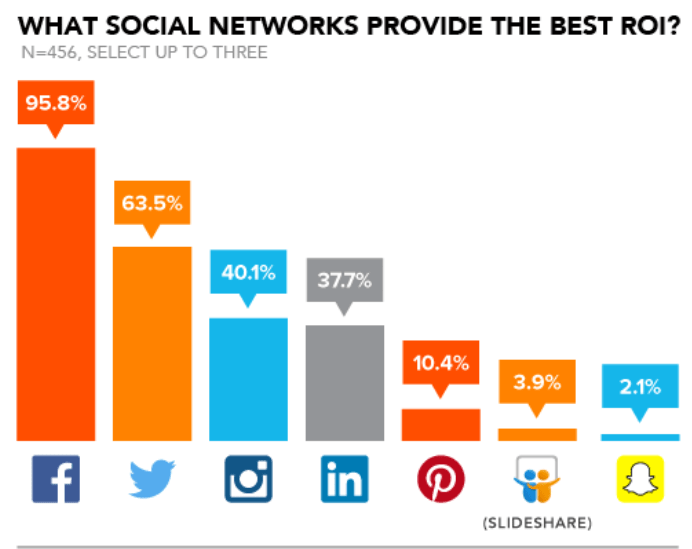
(Source: SocialFresh)
Restaurant owners often overlook Instagram and Pinterest as potential lead-generating social media platforms. The visual nature of these services allows you to showcase your delicious dishes and pique interest in your business. Having your posts link back to pages and posts on your website will generate the link traffic required to boost your standing with search engines.
Create a Complete Google My Business Listing
Google My Business is a free directory service that Google offers for businesses and is one of the most vital steps for any business. When conducting a query on the search engine, you will often find Google My Business listings popping up in the top spots. By creating a complete listing with plenty of information on your business, you will gain visitors and propel your site ranking higher. Google My Business also allows you to see how visitors interact with your page, leading to valuable and actionable SEO knowledge.
Signing up and verifying your business is easy with this step-by-step process.
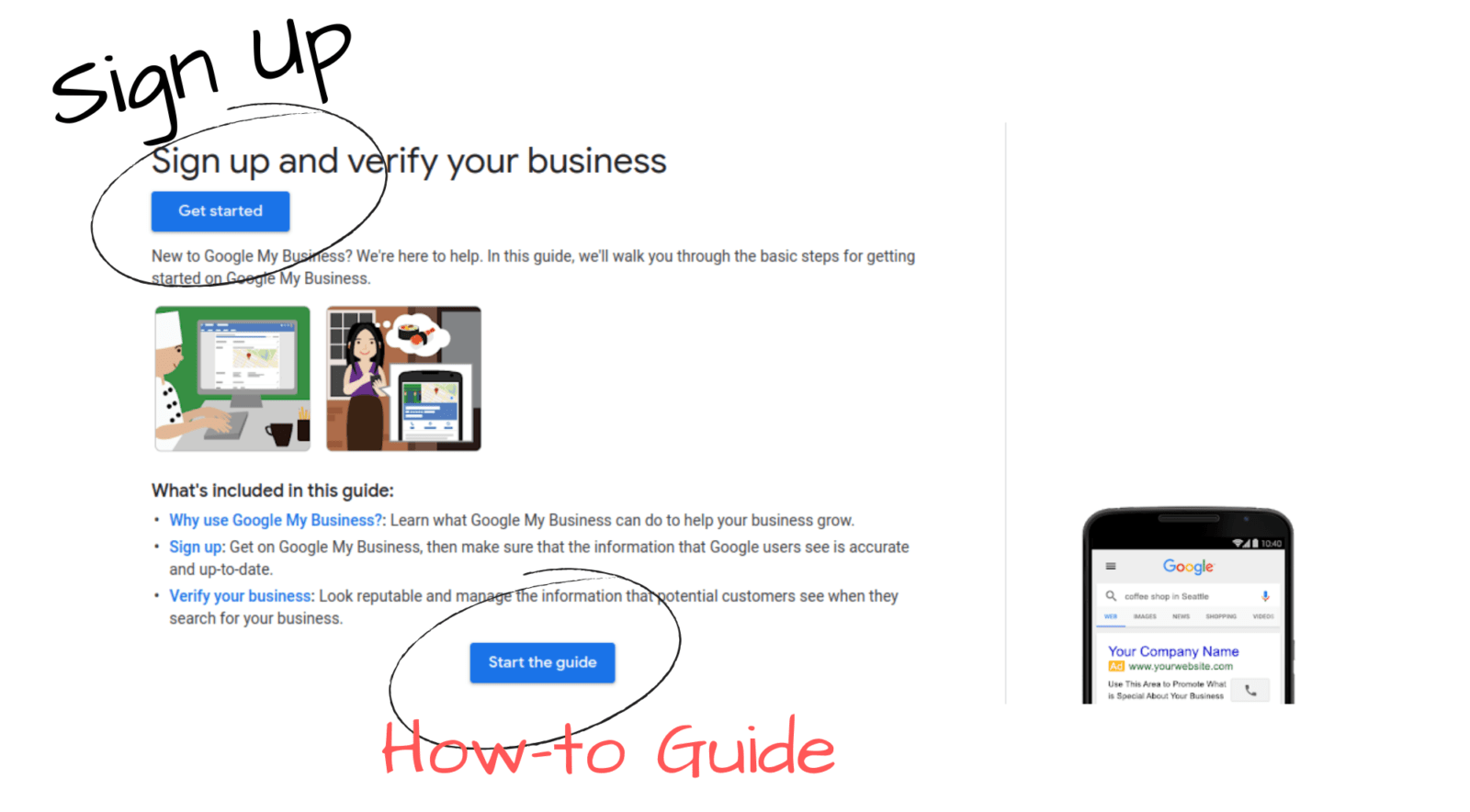
Ranking in Maps
Google My Business also offers you the ability to interface with Google Maps. When creating your listing, you pinpoint your restaurant on the map, making your establishment easy to find for prospective customers. A complete Google My Business profile can mean the difference between a mere point on the map and a listing that jumps out at users. Check out the Diib.com profile listed below. You’ll see the listing on the left and the Google My Business listing on the right, complete with a map for directions to the business location.
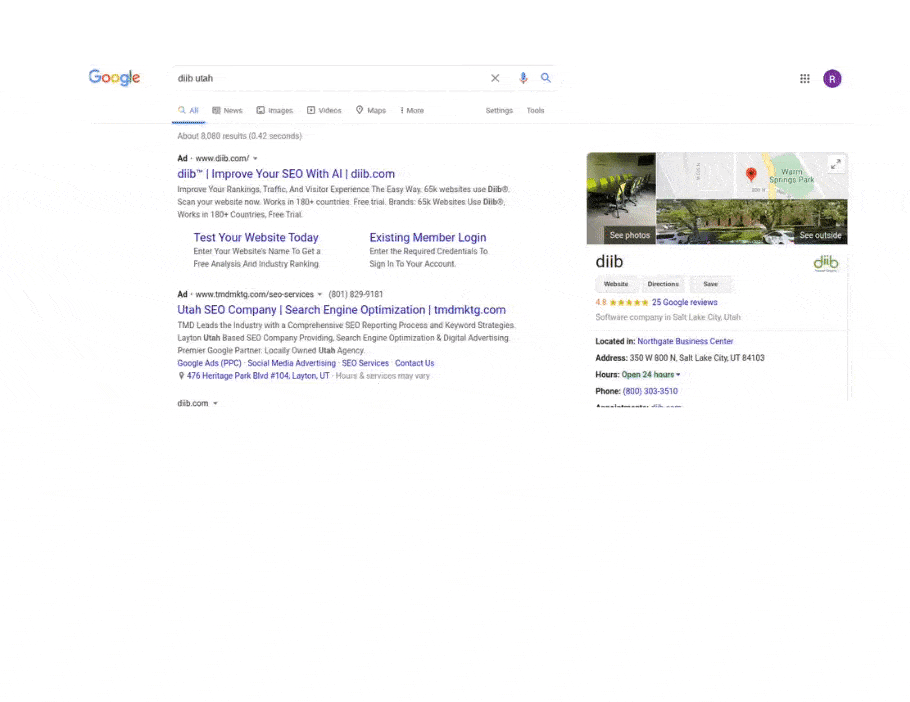
We hope that you found this article useful.
If you want to know more interesting about your site health, get personal recommendations and alerts, scan your website by Diib. It only takes 60 seconds.
Citation Building
Consider citation building as a way of leaving breadcrumbs on the internet for prospective customers to follow to your restaurant. It is the practice of sending out information about your restaurant to listing directories so that people can find you.
Citation building is beneficial to both your SEO efforts and for increasing foot traffic. In terms of search engine optimization, it is a type of link building as you will be amassing links that ultimately point back to your website. Your restaurant address and phone number at the very least should be made available as widely as possible.
Citation Building: is the process of accruing mentions of your business across the web on websites and local directories (like yelp, Google My Business, amazon). Having these citations on relevant or reputable websites will boost your credibility with Google and increase your search ranking.
Restaurants Without Websites
Very few restaurants without websites can hope to build a big customer base. If you’ve built a strong brand with deep-rooted community interaction, it is possible to have constant business without one. However, even in that case, a couple of social media profiles and directory listings may be needed in order for people to be able to find you.
Building a website is more inexpensive than ever. There are many free tools you can use for building your site and a domain name and web hosting are very affordable. A free content management software tool like WordPress can make your life a whole lot easier.
WordPress is a system that uses a graphical user interface to guide your site-building. You can install a variety of plugins that allow you to do everything from insert contact forms to track usage statistics. If you’ve never had a website for your restaurant or if you’ve had one created but left the management to a third party, managing your restaurant’s website can prove to be a game-changer.
By having your own website, you can dictate the message you broadcast to your community. You can put your best foot forward and place your restaurant under the best light. You can also extract measurable statistics that will allow you to improve your business.
Diib® Analytics Software: Turn Data Into Dollars
With the tips above, you’ll have a great headstart into the complicated world of restaurant SEO and have the confidence to make adjustments in order to climb the search engine rankings and place your restaurant in front of thousands of potential customers.
The answer engine® is the perfect platform for helping you refine your restaurant SEO strategy. You can easily see how you’re doing in Google My Business, what you’re ranking for in organic search, and see how your backlinks are helping you increase your rankings.
One of the most important factors to ranking on Google is to fully complete your Google My Business listing. Google likes being able to give their customers as much information as possible, therefore, the more information you can supply, the better your ranking will be. Make sure all information is kept as up to date as possible, with accurate information!
One of the best ways to earn 5-star reviews is to encourage your happy, satisfied customers to leave a review. Most customers, upon having a good experience with a business, want to give something in return and 7 out of 10 of them (if asked) will leave a positive review.
Schema markup will make your web page look better in search engine results pages (SERPs) because it enhances the rich snippets displayed under the page title of your content. This will help the local business stand out in search results, and get up to 30% higher click through rates, higher organic traffic, and more conversions.
By all accounts, the average time for websites to rank on Google through search engine optimization (SEO) techniques is about three to six months. This estimate, of course, depends on the competitiveness of your local restaurant industry and popularity of your keywords.
While we definitely recommend having a website, it is still possible to appear on Google without one. First, complete a Google My Business profile and keep it current. Make sure all photos have geotags and that you have a competitive social media strategy. Local SEO strategies can have a significant business impact, even without a website.
Where Google Maps previously let people click to quickly find restaurants and coffee shops, users will now see options for takeout and delivery in the app. To use the new feature, all you have to do is open the app on iPhone or Android. Then, at the top of the screen, you’ll see the two new default buttons for takeout and delivery. If you tap “takeout,” you’ll see restaurants that Google knows will let you pick up outside of the restaurant. If you tap “delivery,” you’ll see restaurants that can bring your food to your home.
Optimizing your site for local traffic and specific keywords will significantly improve your local and niche business. Specifically optimizing for mobile friendliness and speed will also target those people out searching for restaurants.
According to Moz, title tags are the 2nd most important SEO ranking factor. This will lead to higher click through rates and, ultimately, conversions.
Look at what your competitors are doing and DO IT BETTER. Update your Google My Business profile, include: photos, menus, videos, reviews, ect. Start a website blog and keep it updated with relevant restaurant content.
SEO can be a daunting task, ranging anywhere from 12 to 144 hours a week, according to top analysts. This really depends on the size of your restaurant, for instance, if you run several, you’ll spend much more time than on simply one. Don’t let this deter you, come up with a plan and stick to it. Looking into a company or analytics dashboard could be a solution to a bulk of the issues you encounter.
Diib works closely with restaurant owners all over the U.S. who are looking to streamline their SEO process and improve local rankings. We provide a custom dashboard where you are able to see how well your website is performing and give you specific objectives for improvement. We can also give you valuable insights into your local competitors and what they’re doing that might be successful. We make the time you spend on SEO more effective, freeing you up to do the things you love. Get started with a free 60 second website scan today!




angry franchise says:
I just opened a franchise and their corporate SEO is NOT GOOD!! I pay over 3% on “Marketing” and as a franchise owner I expect to show up on the maps and have some presence. Guess I have to do this myself. Thanks for the info though.
Mark Steve says:
I like it.
Mark Steve says:
Such a great podt.
Hamad ali says:
keep up the good work
uzzol says:
Lead generation services are increasingly becoming popular with the industry getting populated with several top-class firms providing efficient solutions to deliver qualified and targeted sales leads for businesses.
Learn more
Robert says:
Hey,
Excellent site you have here. It’s hard to find high quality writing like yours these days. I honestly appreciate individuals like you.
Cheers!
10seos says:
Excellent post. Great resources
kexlin software solutions says:
Thanks for Sharing!I want to thank you for this Post, with the help of this blog I got a lot of information like quick SEO optimization tips for blog. Keep Posting
Digital Marketing Agency says:
Oh My God!!! This is a great blog, I am happy that I have come across this one. It’s an amazing blog to read, so many things about restaurant seo. Thanks for this wonderful content. I love this blog and really happy to come across this exceptionally well written content. Thanks for sharing!!Well, I have visited another site Flightdigital.co.nz having some wonderful and similar information.
Affordable Seo North Shore says:
This is a very informative blog, thanks for sharing about these restaurant seo. It will help a lot; these types of content should get appreciated. I will bookmark your site; I hope to read more such informative contents in future… great post!!Well, I have visited another site Yodle.nz having some wonderful and similar information.
clic aquí says:
Pero si tu web no está acompañada de los elementos que los motores de búsqueda, como Google, pueden reconocer, entonces tu web no se verá impulsada y estos no llevarán a tus clientes potenciales hacia tu web.
Blitzo says:
Wow! excellent post, thanks for sharing, with this post I got a lot of information of this restaurant.